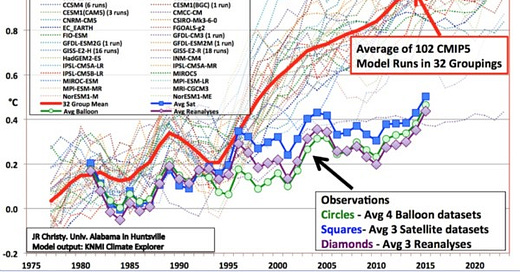We keep being told to “trust the science,” both for Covid and climate change. Given what you now know about Covid and the lies that were told, how much do you trust “climate science?” It’s a vital question to answer, given the enormous impact on our freedom and our wallets that will result from the actions recommended to “save the planet.” Don’t get me wrong. We have to respect Mother Nature, but we also have to be smart about it. There simply are too many problems with the data (seed-picking) and the climate models to believe that we need to give up clean natural gas, buy a car with the nightmare of long charging and spend more tax dollars on things that might only have a small impact.
The bottom line is that climate change has always and will always happen. We see changes every year, and, over millennial time, drastic climates, like the Ice Age, have wrought major changes to the planet and its life forms. This is how it works.
Modeling
Creating mathematical models to predict the future is fraught with risk. I spent a lot of my career using computer modeling tools, so I know that you have several major problems. 1. Most models assume linear change, but not all change is linear. The more complex the system, the more likely it is that assuming that change is linear will be a mistake. 2. Garbage-in, garbage-out. If you put in just part of the data, seed-picking to get the result you want, you will get a false result. It’s easy to do. 3. A model is someone’s idea of the way a system works. If their idea is wrong, the model will give bad results. Unfortunately, there’s a ton of problems with the climate models. Below, the figure shows what two prominent climate scientists have shown are the differences between model predictions and actual data. You don’t have to be a scientist to think the model is flawed. The red line is what the model shows would happen and the observations show what really did, year-to-year.
Citing extensive data to support their case William Happer, professor emeritus in physics at Princeton University, and Richard Lindzen, professor emeritus of atmospheric science at Massachusetts Institute of Technology (MIT), argued that the claims used by the EPA to justify the new regulations are not based on scientific facts but rather political opinions and speculative models that have consistently proven to be wrong.
“The unscientific method of analysis, relying on consensus, peer review, government opinion, models that do not work, cherry-picking data and omitting voluminous contradictory data, is commonly employed in these studies and by the EPA in the Proposed Rule,” Mr. Happer and Mr. Lindzen stated. “None of the studies provides scientific knowledge, and thus none provides any scientific support for the Proposed Rule.”
“All of the models that predict catastrophic global warming fail the key test of the scientific method: they grossly overpredict the warming versus actual data,” they stated. “The scientific method proves there is no risk that fossil fuels and carbon dioxide will cause catastrophic warming and extreme weather.”[1]
Why the Desire to Be Wrong?
When you question the political “truth,” you need to ask why people would opt to impose draconian measures on the public if there is so much proof that the fear is unwarranted, or at least overplayed. You also wonder if we are looking at the wrong problems facing us humans. We keep hearing about “consensus” as if agreement means truth. But it doesn’t.
But Mr. Happer argues that consensus is not science, citing a lecture on the scientific method by renowned physicist Richard Feynman, who said, “if it disagrees with experiment, it’s wrong.” “Science has never been made by consensus,” Mr. Happer said. “The way you decide something is true in science is you compare it with experiment or observations.
“It doesn’t matter if there’s a consensus; it doesn’t matter if a Nobel Prize winner says it’s true, if it disagrees with observations, it’s wrong,” he said. “And that’s the situation with climate models. They are clearly wrong because they don’t agree with observations.”
“Science, on the contrary, requires only one investigator who happens to be right, which means that he or she has results that are verifiable by reference to the real world,” Dr. Michael Crichton, physician and author at the California Institute of Technology said. “In science, consensus is irrelevant. What are relevant are reproducible results.”
“The initial predictions of climate disasters had New York flooded by now, no ice left at the North Pole, England would be like Siberia by now,” Mr. Happer said. “Nothing that they predicted actually came true. You have to do something to keep the money coming in, so they changed ‘global warming’ to ‘climate change.’”
So, what’s really going on? In fact, it’s politics. No surprises there. If you can scare someone (or everyone) into believing a threat, you can take government action implausible without the threat. Politicians gain control of your life and your money.
It’s working. People are terrified that their gas stove will kill the planet. They believe that an electric car will fix everything, despite how its construction despoils the planet AND that the electricity has to come from somewhere. The car itself may be low impact when you drive it, but it is NOT low impact in any other sense.
Don’t fall for this scam. The politicians will only increase their grasp of your freedoms and wealth if we cave into their game. Do your part to lessen your impact on the planet if you wish, but don’t let them impose extreme measures based on a fallacy. You’re smarter than that. physician and author Michael Crichton at the California Institute of Technology
[1] Epoch Times, August 14, 2023




